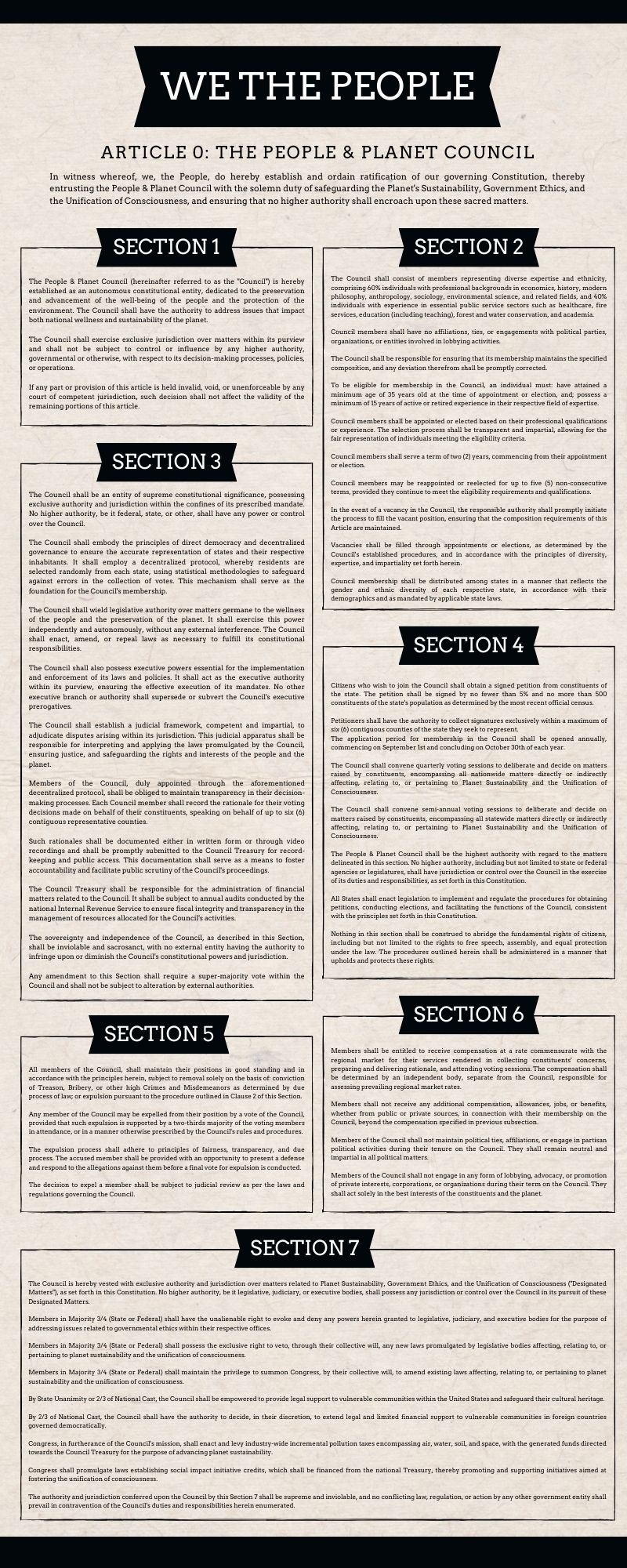PART VII _ In today's rapidly evolving world, digital transformation and transparency through blockchain technology are revolutionizing how we tackle pressing social and economic issues.
The convergence of digital transformation, sustainability and responsible investing are reshaping global approaches to social, environmental and economic issues.
As illustrated in Part V and Part VI of this paper, providing more transparency and holding government appointees and public service officials accountable for their policies and actions is crucial to ensure the well-being of any nation and its ability to find the right balance between evolving policies and maintaining the stability needed for long-term progress.
Ratify the Constitution to Establish Unity, Sustainability and Strengthen Democracy
Out of almost 12,000 amendments proposed since the founding of the Constitution, only 27 have been adopted (not counting the Declaration of Independence), with the last amendment—which extended the legal voting age to 18—occurring over 50 years ago.
This low record may have surprised the nation’s founders. Ample historical evidence supports the assertion that those who drafted and ratified the U.S. Constitution considered it essential that the American people have the final say on its meaning. They knew the Constitution they had created was imperfect and assumed that future generations would fix their mistakes and regularly adapt the document to changing times. In 1787, James Wilson said to a crowd:
“If there are errors, it should be remembered that the seeds of reformation are sown in the work itself...”
Additionally, Governor Morris wrote about the mindset of the Constitution's framers:
“Surrounded by difficulties, we did the best we could; leaving it with those who should come after us to take counsel from experience, and exercise prudently the power of amendment, which we had provided.”
Thomas Jefferson went further when he proposed that the nation adopt an entirely new charter every two decades. In writing to James Madison in 1789, Jefferson said:
“Every constitution then, and every law, naturally expires at the end of 19 years. If it be enforced longer, it is an act of force, and not of right.”
Indeed, the University of Chicago Law School estimates that since 1789, most national constitutions have lasted an average of only seventeen years.
Does the current generation's experience with growing inequality and pollution-induced climate change, along with the necessity of achieving NetZero by 2050, raise the question of updating the U.S. Constitution to establish a foundational agreement that drives greater equality and sustainability?
Such an update would not only strengthen the democracy of the nation by building from a common foundation of sustainability and inclusion but also ensure that coming generations grasp the repercussions of prior policies and recognize the importance of environmental stewardship.

Uphold Article 0 For Sustainability of the Planet and Unity of the People
Article 0 implements fiscal checks and balances on all matters affecting sustainability of the planet and unification of consciousness. Upholding Article 0 will require the government and the people's commitment to transparency and accountability.
To achieve this, a novel approach is proposed: implementing a system of either credits or progressive taxes directly tied to a government or entity's compliance with the reporting and implementation requirements of Article 0.
The overall mechanism would not only encourage adherence to the principles outlined in Article 0 but also serve as a powerful incentive for entities to prioritize transparency in matters of sustainability of the planet and unity of the people.
The progressive taxes, tied to the entity's compliance with the 'Planet & People Distributed Ledger,' would help ensure that non-compliance carries increasingly significant financial consequences, making it in the best interest of private, public, and non-profit organizations to embrace transparency and ethical practices proactively.
By linking financial consequences to compliance, the initiative aims to create a robust economic motivator for businesses, government agencies, and non-profit organizations to act by the environmental and social principles of transparency and accountability.
In addition to this financial incentive, the initiative recognizes the need for a broader cultural shift towards transparency within both government and industry. It advocates for a fundamental requirement of transparency from these entities.
In pursuing these goals, the initiative recognizes the multi-faceted impact of transparency.
- Financially, it can lead to more accountable and responsible business practices, reducing the potential for financial misconduct and fraud.
- Politically, it promotes good governance by ensuring that decision-making processes are open and accessible, ultimately strengthening democratic principles.
- Environmentally, transparency can facilitate the responsible management of resources and the mitigation of environmental harm, contributing to sustainability efforts.
- Socially, it engenders trust and accountability, leading to more equitable and inclusive societies benefiting marginalized and vulnerable populations.
Ultimately, Article 0's commitment to transparency and the resulting culture of disclosure and openness has the potential to bring about positive changes in various aspects of society, fostering a more just and sustainable future.
Make Amends for Prior Harm to the People and Planet
Article 0 would also require government entities to make reparations for those whose livelihoods have been impacted by the direct and passed down influences of human trafficking and enslavement, including the ensuing systems of racial bias.
Additionally, prior misleading actions and practices that endanger people and the planet, such as cleaning up environmental injustices and spillages in underserved markets, must be amended.
Additionally, the negative impact of deforestation, especially in the Amazon forests and U.S. Appalachian Mountains, including destroying biodiversity and indigenous peoples' ancestral lands which are essential for sustenance, spiritual practices, and upholding the traditions and lifestyles of their people, must be amended.
Drive Future Decisions for the People and Planet
In addition to amending past mistakes, Article 0 would necessitate clearing the path forward for a more equitable and sustainable future. This would include:
- Offering legal and financial assistance to native and indigenous communities, minorities, and emerging market groups when they find themselves in legal disputes with large or foreign corporations. These disputes typically arise due to concerns about the corporations' questionable ethical practices and lack of transparency, which are believed to impact the local economy significantly.
- Safeguarding the well-being of individuals who have been and continue to be advocates against systemic bias, inequalities, and outdated energy and consumption practices.
- Offering financial and resource assistance to foster entrepreneurship in underserved markets.
- Empowering minority entrepreneurs and R&D in STEM fields.
- Engaging in climate research focused on foreign markets.
- Contributing to wildlife conservation efforts.
- And more.
Empower Grassroots Development
Article 0 entices individuals and corporates to participate and contribute in the development of a sustainable and inclusive economy for all. Grassroots development and empowerment are at the heart of creating positive change within underserved communities.
Grassroots development involves disadvantaged individuals coming together to enhance the social, cultural, and economic well-being of their families, neighborhoods, and broader societies. It's a bottom-up approach wherein the government provides the necessary resources but empowers the community to take charge and ownership for creating a better future.
One practical way to support grassroots efforts is for corporations to dedicate one day a week to community service or volunteering through corporate social responsibility (CSR) initiatives.
By allocating one day out of the workweek to give back to the local community, individuals and businesses can make a meaningful impact and contribute to the growth and prosperity of the areas they serve.
This commitment to grassroots development and community engagement fosters a sense of social responsibility and strengthens the bonds that connect us all, ultimately leading to more resilient and vibrant societies.
Enact a Decentralized Council to Oversee State and Federal Government
Article 0 gives the People a voice in all matters of government ethics and unification of consciousness. Implementing a decentralized federal council, directly representing the public and providing real-time feedback independent of politicians, would help ensure greater democracy by granting citizens immediate access to decision-making processes, fostering diverse voices that genuinely reflect the public, and influencing policy formation.
Consider if the U.S. would have gone to war in Vietnam if the decision was made in alignment with the voice and vote of the people?
Improve the Democratic Process and Representation
Enhancing democratic process and representation involves granting the ultimate authority to the people ensuring transparent voting practices.
Article 0 also provides a platform for current non-voters, who abstain from voting due to perceived systemic biases, to have their voices heard, allowing the vote to represent a more significant and diverse audience. For example, in the last U.S. election, around 80 million eligible voters—roughly 1/3rd of the population—did not cast a ballot. Non-voters reasons for not voting include:
- Not being registered to vote (29%),
- Not being interested in politics (23%),
- Not liking the candidates (20%),
- A feeling their vote wouldn't have made a difference (16%), and
- Being undecided on whom to vote for (10%).
Ensure Accountability and Ethical Governance
Moreover, Article 0 aims to champion the principles of popular sovereignty concerning global and national issues tied to the sustainability of the planet and the unity of its inhabitants. But how would it work?
Article 0 requires implementation of a rolling and decentralized jury of 500 citizens to ensure accountability and ethical governance, representing the nation's diversity and the people's voice. This approach serves multiple purposes, including:
- Ensuring citizens’ approval of leaders' ethics,
- Enhancing checks and balances regarding ethical matters within executive, judicial, and legislative government affairs,
- Combating corruption within the American political system and,
- Safeguarding against political decisions that the highest corporate bidders can easily influence today.
Promote Multilateral Collaboration to Finance Sustainable Global Solutions
Article 0 encourages cross-border collaboration and partnerships to close the global health and wealth gaps. Financing this effort will require multiple systems working together.
One promising approach is Public-Private Partnerships (PPP) to create interconnected hubs of net-positive labs and villages. These hubs can serve as epicenters for sustainable development, fostering collaboration between governments, businesses, and communities to address pressing issues such as climate change and environmental degradation.
In addition to PPPs, an essential aspect of financing involves addressing historical injustices. This includes:
- Implementing retroactive taxes and restitution for misappropriated cultural artifacts, such as gold, sculptures, and art, taken from indigenous communities and developing countries during colonization or occupation.
- Implementing retroactive taxes and restitution to extract natural resources ensuring that countries benefit fairly from exploiting their nation's natural resources, is essential to rectifying historical injustices. Countries can work towards a more equitable and just global resource distribution system by implementing measures like taxes and restitution.
- Providing back salaries for those individuals, families, and communities who have endured enslavement, slave labor, sharecropping, and the like.
- Implementing retroactive fines for any person, company, and industry who has participated in taking over or otherwise harming sacred ancestral lands, as well as requiring by law that these lands be returned to their rightful native owners. For instance, the Indigenous people of Hawaii regard their land as an embodiment of their spirituality and cultural heritage, just as their ancestors did.
- Requiring large corporations to allocate meaningful resources and participate in weekly sessions that support local initiatives and help accelerate economic development of underserved regions through to 2050.
- Implementing a Billionaire tax to fund the People & Planet Council Treasury in order to help rebalance national and global wealth distribution.
Furthermore, much of the funding should come from holding the largest carbon-emitting nations and industries accountable for contributing to pollution-induced climate change. Imposing back pay and taxes for all emissions after they have signed international agreements, for example, the 2015 Paris Agreement, can provide substantial funding for sustainability initiatives.
Lastly, intellectual property enforcement is another avenue for generating revenue for sustainable solutions. Protecting and fairly compensating innovators and creators, especially from minority and underserved groups, can foster a culture of innovation that aligns with global sustainability goals.
Incorporating these multi-faceted approaches to financing sustainable global solutions can help provide the resources needed to build a more equitable, sustainable, and prosperous world for all.
Unlock Sustainable Change in Tripartite Systems of Government
Article 0 also enables and empowers the People to enact change. The growing global income disparities, inequality, and continued dependence on industries and activities that exacerbate pollution-induced climate change are seemingly at odds with UN members' commitments to the 2030 Sustainable Development Goals. The consequences of slow or no action to mitigate these risks have dire consequences, including hindering the general welfare and commerce opportunities of each nation and its citizens.
Why haven’t member nations enacted their power to create change?
Take the U.S. for example. Article 1, Section 8 of the U.S. Constitution describes the enumerated power of the U.S. Congress and includes 18 clauses. Clause 3, known as the Commerce Clause, describes the power of Congress to:
“Regulate commerce with foreign nations, and among the several states, and with the Indian tribes.”
As such, the Commerce Clause includes the power to prohibit state legislation that would discriminate against or excessively burden citizens’ ability to participate in interstate commerce.
The Commerce Clause represents one of the most fundamental powers delegated to Congress by the framers of the Constitution, as it directly affects the lives of American citizens.
The United States Constitution also references its power and duty to provide for "the General Welfare" of the nation. One occurs in the Preamble, and the other is included in the Taxing and Spending Clause (Article I, Section 8, Clause 1). This clause states that Congress shall have the power to:
“Lay and collect Taxes, Duties, Imposts, and Excises, to pay the Debts and provide for the common Defense and general Welfare of the United States; but all Duties, Imposts, and Excises shall be uniform throughout the United States."
Much of the Court's modern Spending Clause jurisprudence has focused on what the Court has termed restrictions or limits on the spending power. The Court today judges the constitutional validity of federal spending using five factors, one of which is that spending must pursue the general welfare, meaning the government's concern for its citizens' health, peace, and safety.
Does the current state of affairs in the U.S.—including the growing disparities, systems of inequality, and global emission production—burden domestic and interstate commerce and hinder the general welfare of the nation and its citizens? If so, will the U.S. Congress execute its prerogative to initiate new laws meant to protect the planet and unify the people?
There is a growing consensus that democratic processes need significant improvement. One key aspect is the need for more democratic avenues to engage with and listen to citizens' voices instead of allowing additional outsized influences, such as corporate lobbying, dictate policies.
Additionally, there is a call for greater oversight over the Supreme Court to ensure that the power and decisions of this institution are firmly rooted in the will of the people rather than being influenced by corporate interests.
Moreover, in a robust democracy, political leaders must heed the majority's views and translate them into practical policies. To achieve this, a deliberate democratic system should allow voting on critical national and global issues affecting the planet's sustainability and collective consciousness unification. The decisions resulting from this democratic process should guide and be reflected in the actions of those in positions of authority who are responsible for serving the interests of the governed.
Implement Effective Limit and Control of Government Power
Article 0 would also help limit and control government power in several critical ways, including by:
- Curtailing the dangerous expansion and abuse of executive authority prevents potential harm to the financial system,
- Rectifying historical injustices such as the denial of rights to opponents of human trafficking and enslavement and to Native Americans,
- Safeguarding citizens from political abuse and corruption, particularly in presidential elections.
Furthermore, this ratification addresses the lack of trust in a leadership model centered around a single person by establishing protective mechanisms.
Lastly, it serves as a platform to arbitrate debates on social justice, recognizing their potential to unsettle and destabilize a nation and its judicial system.
Drawing from the ideas of Ernest Gellner—a philosopher and social theorist best known for his work on nationalism and the role of culture in modern societies—these measures aim to strengthen the democratic foundation of the nation, ensure the nation remains responsive to the needs and aspirations of the broader public, and create cohesiveness among the people.
Gellner argued that nationalism and spreading a shared culture or national identity played a crucial role in modernizing societies. In his view, sharing a common culture and identity could provide a sense of cohesion and stability, reducing the likelihood of authoritarian rule or oppressive governance.
A well-functioning nation with a shared culture could act as a check on authoritarian tendencies by fostering a sense of unity and cooperation among its citizens.
Why the U.S. Must Lead the Way
As a critical player in the global economy, the United States significantly influences widening inequality worldwide.
While one of the wealthiest developed nations, the U.S. has a complex relationship with global inequality.
Economic policies, trade practices, and consumption patterns can either contribute to narrowing the gap or perpetuating disparities, affecting vulnerable communities within the U.S. and the Global South. Understanding the role of the U.S. in this global dynamic is crucial in devising practical solutions at a global scale.
On the one hand, U.S. contributions to global development initiatives, foreign aid, and humanitarian assistance play a role in alleviating poverty and addressing health disparities in some regions.
However, certain U.S. economic practices exacerbate inequality and environmental degradation. For instance, trade policies prioritizing corporate interests and not protecting intellectual property rights may hinder access to essential medicines and technologies for developing countries, limiting their ability to improve public health and well-being.
Additionally, a consumption pattern principally observed in the global North is driven by a culture of excess and consumerism, which could indirectly contribute to resource exploitation and environmental degradation in other parts of the world.
Is it necessary for the progress of one nation to always come at the detriment of others? Or can nations be encouraged to nurture a natural sense of altruism through a shared moral bond of solidarity? The concept of a zero-sum game has its constraints.
"In our time, it's about recognizing that for much too long, we've allowed a narrowed and cramped view of the promise of America — a view that America is a zero-sum game, particularly of the recent past. "If you succeed, I fail." "If you get ahead, I fall behind." And maybe worst of all, "If I can hold you down, I lift myself up."
Instead of what it should be — and it’s just self-evident — “If you do well, we all do well.” That’s keeping the promise of America. – Remarks by President Biden at the 10th Anniversary Celebration of the Dedication of the Dr. Martin Luther King, Jr. Memorial
Furthermore, the role of the U.S. in the global financial system can have significant implications for the wealth gap. As a center for international finance, the U.S. can influence capital flows and investment decisions that may impact economic development in different regions.
Addressing the role of the U.S. in perpetuating the global health and wealth gap requires a comprehensive and collaborative approach. This involves reviewing and reforming trade policies to ensure fairness and inclusivity, promoting responsible consumption and production patterns, and actively participating in global efforts to achieve sustainable development.
For better or worse, the United States often serves as an example for the rest of the world in various aspects. Historically, the actions taken in the U.S. have been echoed in other nations.
This may not continue to be the case as perceptions of the U.S. are varied and, in some views, are declining. However, recognizing its influence and embracing its responsibility now, the U.S. could still play a pivotal role in creating a more equitable, prosperous, and sustainable world for all—if it chooses to do so.
SUMMARY
Systems of exclusion lead to inequality and social unrest. Recognizing the inherently biased and flawed nature of the founding principles and statutes in the Constitution can lead to more open and honest debates and bring better solutions to the table to better serve the general welfare and interstate commerce opportunities for all.
The U.S. Constitution is neither a self-actuating nor a self-correcting document. It requires the constant attention and devotion of all citizens. Democratic republics are not merely founded upon the people's consent; they are also absolutely dependent upon the active and informed involvement of the people for their continued well-being and the health of the planet to be a true democracy.
Today is World Science Day for Peace and Development, which highlights the vital role science plays in society. As such, Ready Player Institute recommends ratifying the United States’ founding documents can support the development of fair, just, and efficient markets while congruently unlocking sustainability and inclusion in the value chain and, helping progress toward a better path forward for all.
Perhaps Amanda Gorman, National Youth Poet Laureate, said it best:
“…We are striving to forge a union with purpose,
to compose a country committed to all cultures, colors,
characters and conditions of man.
And so we lift our gazes not to what stands between us,
but what stands before us.
We close the divide because we know, to put our future first,
we must first put our differences aside.
We lay down our arms
so we can reach out our arms
to one another…”
- Excerpt from “The Hill We Climb,” by Amanda Gorman
ABOUT READY PLAYER INSTITUTE
Ready Player Institute is a 501(c)(3) non-profit organization addressing disparities in underserved and vulnerable regions, including LATAM, the Caribbean and Pacific Islands.
Their mission is to foster greater diversity and inclusion within research and entrepreneurship, all while harnessing innovation and technology to drive sustainable solutions.
Your contribution to Ready Player Institute through Uprise will directly support individuals from minority backgrounds in underserved regions. These funds will enable them to access essential training and laboratory programs aimed at digitizing tangible assets, improving educational opportunities, advancing healthcare services, optimizing the food supply chain, and addressing the pressing issue of climate change.
Ready Player Institute collaborates closely with Project DARP, Ready Player Infrastructure, and Ready Player Ventures, forming a comprehensive network dedicated to positive change and innovation.
Your support can make a meaningful difference in their efforts to empower underserved communities and drive progress in these critical areas.
🌍 Join Us in Making a Difference! 🌱
Do you have innovative ideas, breaking news, groundbreaking research, or expert insights that can help tackle climate change, environmental pollution, and social inequity? Share your voice with the world and be a catalyst for positive change. Together, we can create a better future!
Contact us today on publishing@readyplayerinstitute.org.









